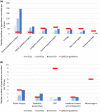Analysing the Operative Experience of Paediatric Surgical Trainees in Sub-Saharan Africa Using a Web-Based Logbook
- PMID: 33289874
- PMCID: PMC7921073
- DOI: 10.1007/s00268-020-05892-6
Analysing the Operative Experience of Paediatric Surgical Trainees in Sub-Saharan Africa Using a Web-Based Logbook
Abstract
Background: The expansion of local training programmes is crucial to address the shortages of specialist paediatric surgeons across Sub-Saharan Africa. This study assesses whether the current training programme for paediatric surgery at the College of Surgeons of East, Central and Southern Africa (COSECSA) is exposing trainees to adequate numbers and types of surgical procedures, as defined by local and international guidelines.
Methods: Using data from the COSECSA web-based logbook, we retrospectively analysed numbers and types of operations carried out by paediatric surgical trainees at each stage of training between 2015 and 2019, comparing results with indicative case numbers from regional (COSECSA) and international (Joint Commission on Surgical Training) guidelines.
Results: A total of 7,616 paediatric surgical operations were recorded by 15 trainees, at different stages of training, working across five countries in Sub-Saharan Africa. Each trainee recorded a median number of 456 operations (range 56-1111), with operative experience increasing between the first and final year of training. The most commonly recorded operation was inguinal hernia (n = 1051, 13.8%). Trainees performed the majority (n = 5607, 73.6%) of operations recorded in the eLogbook themselves, assisting in the remainder. Trainees exceeded both local and international recommended case numbers for general surgical procedures, with little exposure to sub-specialities.
Conclusions: Trainees obtain a wide experience in common and general paediatric surgical procedures, the number of which increases during training. Post-certification may be required for those who wish to sub-specialise. The data from the logbook are useful in identifying individuals who may require additional experience and centres which should be offering increased levels of supervised surgical exposure.
Conflict of interest statement
Ciaran Mooney, Sean Tierney, Miliard Derbew, Eric Borgstein declare no conflict of interest. Eric O’Flynn declares grant funding for the RCSI/COSECSA collaboration programme, though no specific funding allocated for this research.
Figures





Similar articles
-
Factors Influencing Exam Performance of Surgical Trainees in Sub-Saharan Africa: A Retrospective Analysis of the College of Surgeons in East, Central, and Southern Africa Membership Examination.J Surg Educ. 2024 Mar;81(3):404-411. doi: 10.1016/j.jsurg.2023.12.004. Epub 2024 Jan 30. J Surg Educ. 2024. PMID: 38296725
-
Analysing the operative experience of basic surgical trainees in Ireland using a web-based logbook.BMC Med Educ. 2011 Sep 25;11:70. doi: 10.1186/1472-6920-11-70. BMC Med Educ. 2011. PMID: 21943313 Free PMC article.
-
The impact of COSECSA in developing the surgical workforce in East Central and Southern Africa.Surgeon. 2022 Feb;20(1):2-8. doi: 10.1016/j.surge.2021.11.003. Epub 2021 Dec 23. Surgeon. 2022. PMID: 34955410 Review.
-
Operative Case Volumes and Variation for General Surgery Training in East, Central, and Southern Africa.World J Surg. 2023 Dec;47(12):3032-3039. doi: 10.1007/s00268-023-07164-5. Epub 2023 Sep 11. World J Surg. 2023. PMID: 37697170 Free PMC article.
-
Australian general surgical trainee experience with inguinal hernia surgery: a review of international training programmes and the learning curve.ANZ J Surg. 2021 Jun;91(6):1138-1142. doi: 10.1111/ans.16897. Epub 2021 Apr 27. ANZ J Surg. 2021. PMID: 33908142 Review.
Cited by
-
Patterns, procedures, and indications for pediatric surgery in a Tanzanian Refugee Camp: a 20-year experience.World J Pediatr Surg. 2023 Jun 21;6(3):e000528. doi: 10.1136/wjps-2022-000528. eCollection 2023. World J Pediatr Surg. 2023. PMID: 37396496 Free PMC article.
-
The use of a surgical logbook to improve training and patient safety: A retrospective analysis of 6 years' experience in Bristol, UK.Skin Health Dis. 2024 Jun 6;4(5):e386. doi: 10.1002/ski2.386. eCollection 2024 Oct. Skin Health Dis. 2024. PMID: 39355737 Free PMC article.
-
The status of pediatric surgery in Malawi: a narrative mini-review.Front Pediatr. 2023 Jul 6;11:1195691. doi: 10.3389/fped.2023.1195691. eCollection 2023. Front Pediatr. 2023. PMID: 37484773 Free PMC article. Review.
References
-
- UNICEF Generation 2030 / Africa, UNICEF, 2014;64.
MeSH terms
LinkOut - more resources
Full Text Sources

